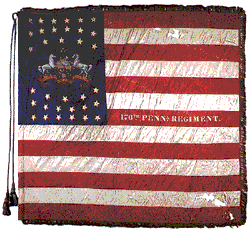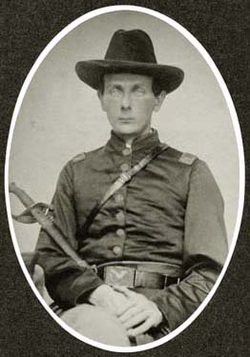The 176th Regiment
Pennsylvania Drafted Militia

The 176th Regiment, Pennsylvania Drafted Militia, was raised by the State Militia Draft of 1862. This draft had resulted from the failure to fill President Lincoln's call for 300,000 militia volunteers during the summer of 1862. Although a strong effort was made by local and county officials to form an all-Lehigh nine month volunteer regiment under the command of General George Fry, the County could not raise enough money to pay the $100 bonuses needed to entice new recruits. The men initially slated for this Lehigh County volunteer regiment were eventually drafted into the 176th on October 16, 1862, amid a growing local anti-war sentiment and strong opposition to the draft. Lehigh's assessment for the 1862 draft was "1,462 able-bodied men between the ages of 21 and 45 years"; however, only seven companies (A, B, D, E, G, I, & K) of this nine-month militia regiment, numbering approximately 460 men, were raised in Lehigh County, with the majority of Company A comprised of men from the Borough of Millerstown (Macungie) and the surrounding Lower Macungie Township. The three remaining companies (C, F, & H) were raised in Monroe County. Several of the Millerstown men had previously served with the 54th PVI Regimental Band as part of the Millerstown Brass Band contingent that had enlisted during the fall of 1861 and had been discharged during August of 1862.
The new inductees left Allentown for Camp Philadelphia on October 30. This military camp had been established on October 25, along the western border of Philadelphia near Haddington, as a rendezvous point for the newly drafted conscripts of eastern Pennsylvania. Within a short time, nearly 7,000 men were assembled within this ninety acre compound. At first, the camp was unruly and severely disorganized. All forms of amateur sutlers, substitute brokers, gamblers, swindlers, and thieves descended upon the new recruits. Some of the men were regularly visited by family members and friends from home, while others periodically left camp and scattered out across the city. The November 5, 1862 issue of the Allentown Democrat newspaper reported "The whole thing is conducted like a disorderly camp meeting - everyone his own boss and doing pretty much as he pleases..." Eventually a disciplined regimental organization was effected with the following staff and field officers assigned by state officials: Ambrose A. Lechler, Colonel; George Pilkington, Lieutenant Colonel; William Schoonover, Major. Colonel Lechler had previously served as ordinance officer to the Second Reserve Brigade during the Seven Days Battle of the Peninsula. Levi Smoyer, of Lower Macungie Township, was commissioned Captain of Company A; Monroe H. Miller, of Millerstown, was commissioned 1st Lieutenant; Levi Giering, of Millerstown, commissioned 2nd Lieutenant; and J. Franklin Mertz, of Millerstown, was appointed 1st Sergeant. Giering later received a field commission to 1st Lieutenant, and Mertz received a field commission to 2nd Lieutenant. Alexander Singmaster, of Millerstown, was initially designated as a 2nd Lieutenant, but was discharged on November 25, 1862, and did not serve with the regiment. On November 27, 1862, the regiment left Camp Philadelphia for Washington, D.C., and then on to Suffolk, Virginia, for training, where it was assigned to Colonel Robert S. Foster’s Brigade of the Seventh Army Corps, Department of Virginia. Here the regiment was subjected to careful instruction and discipline through December 1862 and, at the recommendation of Colonel Foster, was selected to accompany his expedition for the reinforcement of the Eighteenth Army Corps, operating upon the defense of Charleston, South Carolina. After proceeding to New Berne, and then Morehead City, North Carolina, the regiment was incorporated into the Eighteenth Army Corps of the Department of North Carolina, under the command of Major General John G. Foster. On January 29, 1863, the regiment set sail for Port Royal Island, South Carolina, and remained there for approximately one week. It was then transferred several times between Saint Helena Island, Port Royal Island, Beaufort, and Hilton Head Island, South Carolina, where it served as a detachment of the Eighteenth Army Corps, Third Division, under the command of Major General John G. Foster and Brigadier General Orris S. Ferry, through April 1863. Through the end of July 1863 it served as part of the Tenth Army Corps, Department of the South, under the command of Major General David Hunter and Brigadier General Quincy A. Gillmore. On August 4, 1863, the regiment was ordered home to Pennsylvania to be mustered out of service. During its nine-month tour of duty, the 176th was not engaged in any hostile operations, but was principally employed for building fortifications and providing garrison protection as part of the blockade and defense of Charleston harbor. It should be noted however, that while few of these drafted militia units ever actually saw combat action, their presence in the South consistently pressured the Confederacy to detach troops from active armies in order to counter the perceived threat of attack. The 176th returned north to Harrisburg, Pennsylvania, and on August 17 through 19, 1863, was mustered out of service. During its nine-month term of service the 176th Pennsylvania Militia lost 44 men to disease. As a side note to history, the 176th Regiment was stationed at Port Royal Island, South Carolina, on June 3, 1863, during arrival of the 54th Massachusetts Colored Troops under the command of Colonel Robert Gould Shaw. The 54th Massachusetts, and their assault on the Confederate stronghold at Fort Wagner in Charleston Harbor, was immortalized in the 1989 Hollywood motion picture ‘Glory’.
The new inductees left Allentown for Camp Philadelphia on October 30. This military camp had been established on October 25, along the western border of Philadelphia near Haddington, as a rendezvous point for the newly drafted conscripts of eastern Pennsylvania. Within a short time, nearly 7,000 men were assembled within this ninety acre compound. At first, the camp was unruly and severely disorganized. All forms of amateur sutlers, substitute brokers, gamblers, swindlers, and thieves descended upon the new recruits. Some of the men were regularly visited by family members and friends from home, while others periodically left camp and scattered out across the city. The November 5, 1862 issue of the Allentown Democrat newspaper reported "The whole thing is conducted like a disorderly camp meeting - everyone his own boss and doing pretty much as he pleases..." Eventually a disciplined regimental organization was effected with the following staff and field officers assigned by state officials: Ambrose A. Lechler, Colonel; George Pilkington, Lieutenant Colonel; William Schoonover, Major. Colonel Lechler had previously served as ordinance officer to the Second Reserve Brigade during the Seven Days Battle of the Peninsula. Levi Smoyer, of Lower Macungie Township, was commissioned Captain of Company A; Monroe H. Miller, of Millerstown, was commissioned 1st Lieutenant; Levi Giering, of Millerstown, commissioned 2nd Lieutenant; and J. Franklin Mertz, of Millerstown, was appointed 1st Sergeant. Giering later received a field commission to 1st Lieutenant, and Mertz received a field commission to 2nd Lieutenant. Alexander Singmaster, of Millerstown, was initially designated as a 2nd Lieutenant, but was discharged on November 25, 1862, and did not serve with the regiment. On November 27, 1862, the regiment left Camp Philadelphia for Washington, D.C., and then on to Suffolk, Virginia, for training, where it was assigned to Colonel Robert S. Foster’s Brigade of the Seventh Army Corps, Department of Virginia. Here the regiment was subjected to careful instruction and discipline through December 1862 and, at the recommendation of Colonel Foster, was selected to accompany his expedition for the reinforcement of the Eighteenth Army Corps, operating upon the defense of Charleston, South Carolina. After proceeding to New Berne, and then Morehead City, North Carolina, the regiment was incorporated into the Eighteenth Army Corps of the Department of North Carolina, under the command of Major General John G. Foster. On January 29, 1863, the regiment set sail for Port Royal Island, South Carolina, and remained there for approximately one week. It was then transferred several times between Saint Helena Island, Port Royal Island, Beaufort, and Hilton Head Island, South Carolina, where it served as a detachment of the Eighteenth Army Corps, Third Division, under the command of Major General John G. Foster and Brigadier General Orris S. Ferry, through April 1863. Through the end of July 1863 it served as part of the Tenth Army Corps, Department of the South, under the command of Major General David Hunter and Brigadier General Quincy A. Gillmore. On August 4, 1863, the regiment was ordered home to Pennsylvania to be mustered out of service. During its nine-month tour of duty, the 176th was not engaged in any hostile operations, but was principally employed for building fortifications and providing garrison protection as part of the blockade and defense of Charleston harbor. It should be noted however, that while few of these drafted militia units ever actually saw combat action, their presence in the South consistently pressured the Confederacy to detach troops from active armies in order to counter the perceived threat of attack. The 176th returned north to Harrisburg, Pennsylvania, and on August 17 through 19, 1863, was mustered out of service. During its nine-month term of service the 176th Pennsylvania Militia lost 44 men to disease. As a side note to history, the 176th Regiment was stationed at Port Royal Island, South Carolina, on June 3, 1863, during arrival of the 54th Massachusetts Colored Troops under the command of Colonel Robert Gould Shaw. The 54th Massachusetts, and their assault on the Confederate stronghold at Fort Wagner in Charleston Harbor, was immortalized in the 1989 Hollywood motion picture ‘Glory’.
Copyright (c) 2011 by the Macungie Historical Society, Inc. All Rights Reserved.
